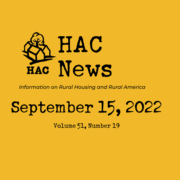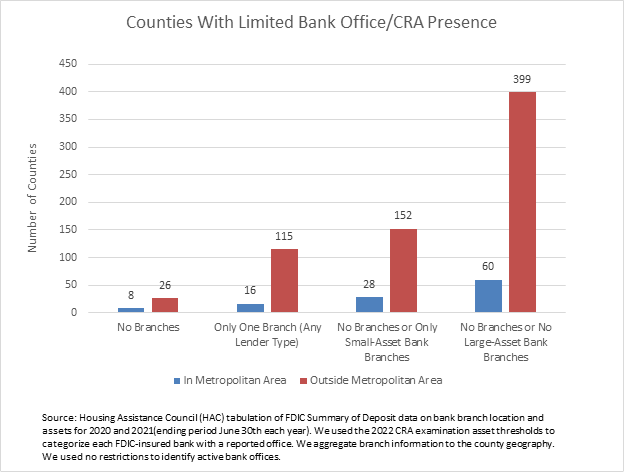HAC News: October 27, 2022
TOP STORIES
New HUD effort addresses homelessness in disaster areas
HUD’s new Rapid Unsheltered Survivor Housing (RUSH) program will provide funding to address homelessness in places hit by disasters. To fill gaps in other programs, RUSH funding will help people experiencing homelessness and those at risk of homelessness. Eligible activities include emergency shelter, rapid re-housing, and outreach assistance, including assistance to meet urgent needs. On October 24, HUD announced it will distribute the first of two 2022 RUSH allocations to the state of Florida and seven localities impacted by Hurricane Ian.
Five barriers to affordable rural housing in the Black Belt
The Montgomery Advertiser reports on a discussion of affordable housing held by experts, including HAC President and CEO David Lipsetz, in rural Alabama. They identified several hurdles, including heirs’ property complications, a lack of infrastructure, and a shrinking construction workforce.
RuralSTAT
In the states of Arizona, California, New Mexico, and Texas, adult residents of counties on the U.S.-Mexico border were more likely than their non-border counterparts to report delaying healthcare because of cost (16.0% versus 14.0%), and disparities were particularly pronounced among those living in counties outside metropolitan areas: 24.1% in border counties compared to 16.1% in non-border counties. Source: National Rural Health Association.
OPPORTUNITIES
Supportive Services for Veteran Families grants offered
Nonprofits and consumer coops can apply by February 10 for SSVF grants to coordinate or provide supportive services to very low-income veteran families who are homeless or at risk of becoming homeless. For more information, contact John Kuhn, VA.
Funds available to help manufactured housing residents with water and wastewater
USDA’s Water and Waste Disposal Technical Assistance and Training Grants program will fund nonprofits to provide technical assistance and training to help improve water treatment and waste disposal systems for rural people living in manufactured homes. Applications are due November 13. For more information, contact Lorrie A. Davis, USDA, 202-568-9046.
Microgrants support marginalized LGBTQ+ older people
SAGE, which provides “advocacy and services for LGBTQ+ elders,” is offering support for ongoing projects involving services and programming for marginalized LGBTQ+ older people (ages 50 and older), including those in rural places. Community groups, coalitions, or organizations with annual operating budgets of $50,000 or less are eligible. Awardees will receive unrestricted funds of up to $5,000, training and resources, and networking opportunities. Applications are due November 18. For more information, email equityinnovation@sageusa.org.
Pro bono staff capacity offered for reducing homelessness
The Harvard Kennedy School Government Performance Lab’s Homelessness Prevention and Rehousing Accelerator offers free hands-on technical assistance for initiatives aimed at reducing homelessness. The GPL will provide dedicated staff capacity for at least 12 months, as well as training and information. State or local jurisdictions, or nonprofits that are Continuum of Care collaborative applicants with a government partner, are eligible. An informational webinar will be held November 2 and applications are due November 18. For more information, email govlab@hks.harvard.edu.
REGULATIONS AND FEDERAL AGENCIES
FY23 Difficult Development Areas and Qualified Census Tracts listed
HUD’s annual lists of designations for use in the Low Income Housing Tax Credit program have been posted online. For more information, contact Michael K. Hollar, HUD, 202-402-5878.
HAC makes recommendations for H-2A farmworker pilot
The USDA Farm Service Agency’s Farm Labor Stabilization and Protection Pilot Grant Program should incentivize accessible, affordable, and decent housing for farmworkers, HAC stated in recent comments. Responding to a request for input on the initiative, HAC also supported regular wellness checks, a survey to collect data on farmworker housing conditions, use of appropriate language and communications methods, and training in workers’ rights.
PUBLICATIONS AND MEDIA
New programs incentivize home energy upgrades
Home Energy Upgrade Incentives: Programs in the Inflation Reduction Act and Other Recent Federal Laws, a policy brief from the American Council for an Energy-Efficient Economy, summarizes programs that will or could provide significant resources for energy efficiency retrofits for existing single-family and multifamily homes.
HUD offers resilience resources for communities and PHAs
- HUD’s Community Resilience Toolkit is designed to help communities enhance their resilience to climate-related natural hazards and risks. It offers resources to help identify climate-related natural hazard risks; enhance the resilience of housing, infrastructure, and residents to those hazards; and implement resilience actions using HUD funds and other innovative financing options.
- An updated Public Housing Agency Disaster Readiness, Response, and Recovery Guidebook recommends actions and funding sources for PHAs.
Flaws identified in FEMA housing inspections process
Disaster Assistance: Actions Needed to Strengthen FEMA’s Housing Inspections Process reports on a GAO review of the housing inspections FEMA conducted for some applicants to its Individuals and Households Program after major disasters in 2018-2021. One change reduced award amounts, while allowing applicants to assess their own damages (now discontinued) resulted in underestimates of damages. GAO made several recommendations, including that FEMA assess the accuracy of its damage level approach and take steps to ensure that its policies on the use of self-assessments are supported by evidence.
Housing program changes needed for people with disabilities
“Disabled people are housing instable and housing insecure, and federal programs are not meeting their needs,” states a fact sheet from the Urban Institute and the Kelsey. People with Disabilities Living in the US Face Urgent Barriers to Housing: Federal Programs Are Not Meeting the Housing Needs of Disabled People reports that 84% of disabled people with low incomes in the U.S., nearly 18 million people, were eligible for housing assistance in 2021 but did not receive it. The authors include several recommendations to reduce barriers to affordable housing for people with disabilities.
Research considers digitalization and housing
Harvard’s Joint Center for Housing Studies released Digitalization and Housing: Framing Paper for “Bringing Digitalization Home: How Can Technology Address Housing Challenges?” This is the first in a series of papers exploring how digitalization – “the strategic use of technologies that collect, create, process, organize, analyze, use, and monetize data” – can be used to address housing affordability, segregation, discrimination, displacement, resiliency, and other current housing-related challenges.
HAC
HAC seeks Research Associate and Housing Specialist – Native American Communities
- The Research Associate conducts original research, manages data, and disseminates information that informs local strategies and national policies to improve conditions for rural Americans. This position is eligible for telecommuting.
- The Housing Specialist – Native American Communities is responsible for providing direct technical assistance, coaching, and training to tribal communities, tribal housing departments, tribal housing authorities, and nonprofit organizations serving tribal communities. Travel is required. This position is eligible for telecommuting.
National Rural Housing Conference set for October 2023
Mark your calendars and save the date! HAC’s National Rural Housing Conference will be held October 24-27, 2023 in Washington, DC and online.
Need capital for your affordable housing project?
HAC’s loan fund provides low interest rate loans to support single- and multifamily affordable housing projects for low-income rural residents throughout the U.S. and territories. Capital is available for all types of affordable and mixed-income housing projects, including preservation, new development, farmworker, senior and veteran housing. HAC loan funds can be used for pre-development, site acquisition, site development, construction/rehabilitation and permanent financing. Contact HAC’s loan fund staff at hacloanfund@ruralhome.org, 202-842-8600.
Please note: HAC is not able to offer loans to individuals or families. Borrowers must be nonprofit or for-profit organizations or government entities (including tribes).
Want to reprint a HAC News item?
Please credit the HAC News and provide a link to HAC’s website. Thank you!

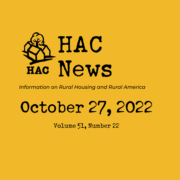
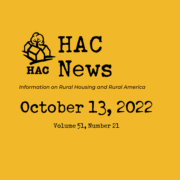
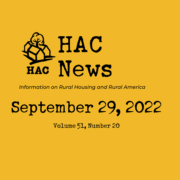
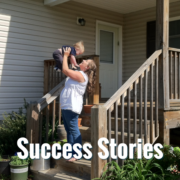
 For thirty years, Adults and Youth United Development Association (AYUDA) has worked to improve housing conditions and increase access to public services in the colonias in and around San Elizario, Texas. According to AYUDA’s Housing and Community Services Director Miguel Chacon, the group was established to advocate for running water and septic tanks in colonias but has grown to providing home repair, rental assistance, vaccine outreach, food distribution, and more.
For thirty years, Adults and Youth United Development Association (AYUDA) has worked to improve housing conditions and increase access to public services in the colonias in and around San Elizario, Texas. According to AYUDA’s Housing and Community Services Director Miguel Chacon, the group was established to advocate for running water and septic tanks in colonias but has grown to providing home repair, rental assistance, vaccine outreach, food distribution, and more. 